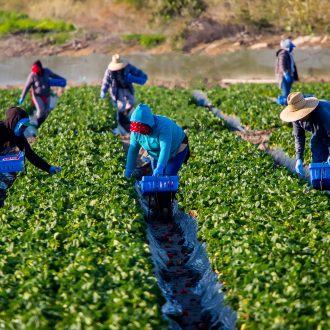
“It is ironic that those who till the soil, cultivate and harvest the fruits, vegetables, and other foods that fill your tables with abundance have nothing left for themselves.” -Cesar Chavez
Hazardous and Unsanitary Working Conditions
- Farm work is one of the most hazardous occupations in the country. The death rate among agricultural workers nationwide was an estimated 20.9 per 100,000 workers in 1996; compared to the average for all industries of 3.9 per 100,000 workers. (Reeves, et. al. “Fields of Poison: California Farm workers and Pesticides.” California Rural Legal Assistance Foundation, Pesticide Action Network North America, and the United Farm Workers of America, AFL-CIO. 1999.)
- Between 1996 and 1999, there was a 33% increase in deaths among California farm workers. During that same time period, there was a 9% decrease in industrial fatalities; in the state of California. (“California Farm Labor By The Numbers.” Sacramento Bee. May 20, 2001.)
- Our nation’s 2.5 million farm workers face a greater risk of pesticide exposure than any other segment of the population. Pesticide exposure can cause a variety of health problems, such as nausea, vomiting, dizziness, rashes and burns. Long-term effects of pesticide exposure can include cancer, sterility, birth defects, and damage to the nervous system. (Reeves, et. al. “Fields of Poison: California Farm workers and Pesticides”; Kegley et. al “Hooked on Poison: Pesticide Use in California, 1991-1998. Pesticide Action Network North America, 2000; Thompson and Wiggins, The Human Cost of Food: Farmworkers’ Lives, Labor and Advocacy.)
- In 2004, the state of Washington found that one in five farmworkers who handles pesticides experienced significant health effects. (Messages from Monitoring, April, 2005)
- Federal laws and regulations give hired farm workers exposed to pesticides inadequate protection. The EPA estimates that farm workers suffer up to 300,000 acute illnesses and injuries from pesticide exposure each year. (“Hired Farm workers Health and Well-Being At Risk.” United States General Accounting Office Report to Congressional Requesters. February, 1992)

- According to the United States General Accounting Office: “Many hired farm workers are unprotected by federal regulations for field sanitation. The absence of drinking water, hand washing facilities and toilets in fields constitutes a serious health hazard to hundreds of thousands of hired farm workers……farms with 10 or fewer workers are exempt from OSHA field sanitation standards.” (Ibid)
- According to the Wall Street Journal: “Despite their long hours and usually arduous toil, California farm workers are often forced to do without clean toilets, toilet paper, soap, paper towels and fresh water for drinking and hand washing.” Tens of thousands of farms throughout the state lack the most basic elements of workplace health and safety. (Marc Lifsher, “California’s Farms Face Pressure to Improve Sanitary Conditions.” Wall Street Journal. March 4, 1998.)
- An investigative report by the Miami Herald found that many Florida farm workers face sweatshop hours, slum housing, poverty pay, and criminal abuse at the hands of third-party contractors; who house and feed the workers “for fees that keep them destitute and in debt.” (Miami Herald. Ronnie Green, “Fields of Despair.” August 31 – September 2, 2003.)



